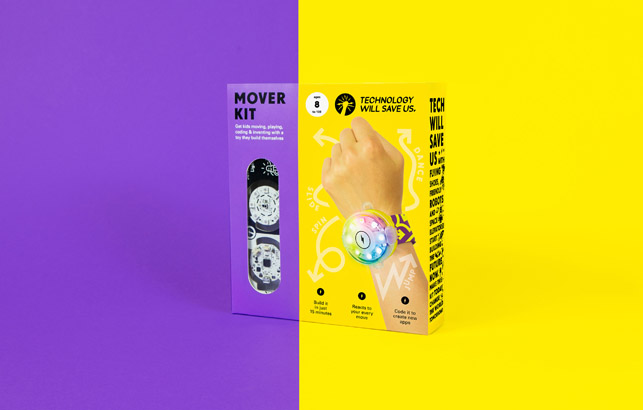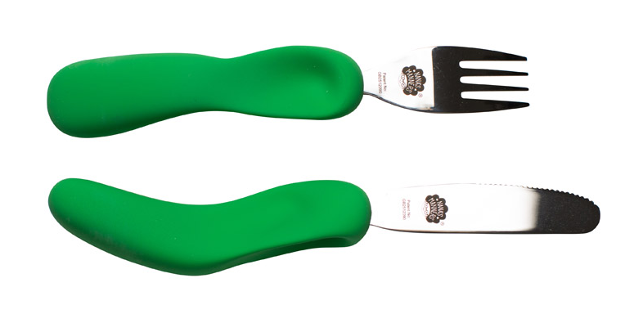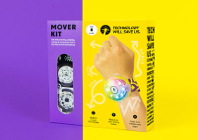
The Rockit is a portable baby rocker that will keep your pram or pushchair rocking so you don’t have to
Rockit bye baby
An activity that many parents can identify with is the jiggle. That is, the need to incessantly be jiggling a buggy or pushchair so that your baby will drift off to sleep. Now, to save parents from arm and foot cramp, three dads – Matt Sparrow, Matt Dyson and Nick Webb – have come up with the ingeniously named Rockit. Attach the small product to a pushchair, for instance, and it will rock away leaving you hands free to drink a coffee, read a book or go to the loo.
The light bulb moment came in 2014 when, in desperation at constantly having to rock his three-month-old daughter’s buggy, Webb, who is an engineer by trade with a degree in vibration and acoustics, knocked up a rudimentary prototype of a buggy rocker.
He used an old printer motor, a simple circuit to control speed, a battery and some gaffer tape.
At a family Christmas, Webb showed the prototype to his brother-in-law Dyson, who at that time was working as a product design teacher. “I thought ‘wow, this is something special’. So we spent time over Christmas googling and seeing what else was out there and we couldn’t find anything quite like it in terms of size and portability.
“At that point I almost immediately decided to give up my day job so I went part time at a sixth form college,” says Dyson.
He introduced his students to the free version of the CAD tool OnShape and using it himself to design the Rockit, he would show his models to the students to illustrate the features in the software.
Working late he also used the school’s workshop to prototype and develop the model. As it developed further, he decided to give up teaching and invested in his own 3D printers for use at home. “I must have got through about 30 rolls of filament,” he says.
“I have on my shelf 30 different versions of the Rockit and hundreds of versions of the bracket that we tested to make sure that it fits any pushchair or pram.”
In the meantime, the other co-director Matt Sparrow helped with the branding side of things. “We pretty much did everything on a shoe string,” admits Dyson.
With their first visual prototype complete and with funding needed for tooling, they decided to enter the Design Council’s accelerator programme Spark, which they were selected for. “Over a period of six months we received a lot of mentoring and input from business advisors and design engineers, notably Gary Paper, to take the Rockit forward,” says Dyson.
The Rockit has been manufactured and was officially launched in mid-October. It is currently stocked on Amazon for £39.95 and national stockists will be included on the website as they come online.

Get kids moving
Bethany Koby and partner Daniel Hirschmann founded London start-up Technology Will Save Us (TWSU) in 2012, shortly after the birth of their first child.
“We had our son Ash, and he was basically born with an iPad. As a parent I wanted more for him and ways to inspire him to create, invent and discover the capabilities of technology as opposed to simply being a passive consumer.
“I wanted to make tech more accessible, more personal, especially for younger generations. Tech Will Save Us was my response to that,” says Koby, who trained and worked as a designer.
Since then the company has launched a range of educational make-it-yourself kits to help kids make, play, code and invent using technology.
The most recent is the Mover Kit, which includes all the pieces needed to make a toy that reacts to movement. For instance, it will light up when the user dances, jumps and runs. It also has an accompanying app so inventions can be shared with an online coding community.
Koby claims that the TWSU team had a lot fun developing this latest product, which involved testing its prototypes with over 300 children.
“As we continued to develop the product, we got even more excited that this wearable was not a smart watch, not a fitness tracker and not about data in a cloud but about something very clear – kids learning through active play,” she says.
To raise investment and to bring it to market, the company launched a Kickstarter campaign where it met its target within 48 hours and raised over $129,000. The product has now shipped and is available to buy on the website for £59.99.

Get a grip
The spark that led primary school teacher Kathryn Baldrey-Chourio down the path of creating Nana’s Manners cutlery for children was when she witnessed her reception class (four and five year olds) trying to eat with a knife and fork.
“The year I went back to teaching after maternity leave in 2011 they’d introduced free hot meals. It was chaos! They needed six adults in the room to move around, cutting up food for the children,” says Baldrey-Chourio.
“That was where my idea came from and I talked it through with my husband and decided I was going to design new children’s cutlery myself.”
She began by modelling the shape out of children’s modelling clay until she landed on a shape she thought was right. To help with patenting her idea, she approached product design consultancy Innovate Product Design. “They took my models and made them look a lot smoother and sleeker,” explains Baldrey-Chourio.
“Then we found a designer who produced the CAD models. He would create a 3D print and I’d then test it with my kids as I was still teaching at this time. That process went on for about a year,” she says.
With the final prototype complete, she decided to quit teaching and start a family business to develop the product.
“We’ve learnt everything as we’ve gone along over the past five years and one of the biggest challenges is that we didn’t appreciate at the beginning how long everything would take,” she admits.
Seeing a light at the end of the tunnel but in need of a final investment push, the pair decided to go on Dragon’s Den, which aired in the UK in October 2017.
They secured a £50,000 offer from fashion tycoon, Touker Suleyman, in exchange for a 30 per cent stake in the business.
“We are so excited to work with Touker Soleyman and his team. Actually we’ve already started work on a range of colours, future product lines and a set of cutlery designed exclusively to help little hands in schools,” she says.
We talk to three ‘parentpreneurs’ who created a business to bring their ideas to market
Default






